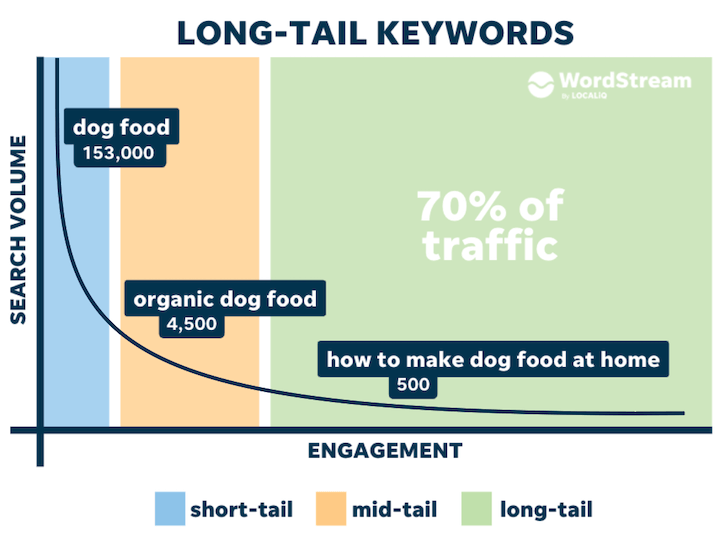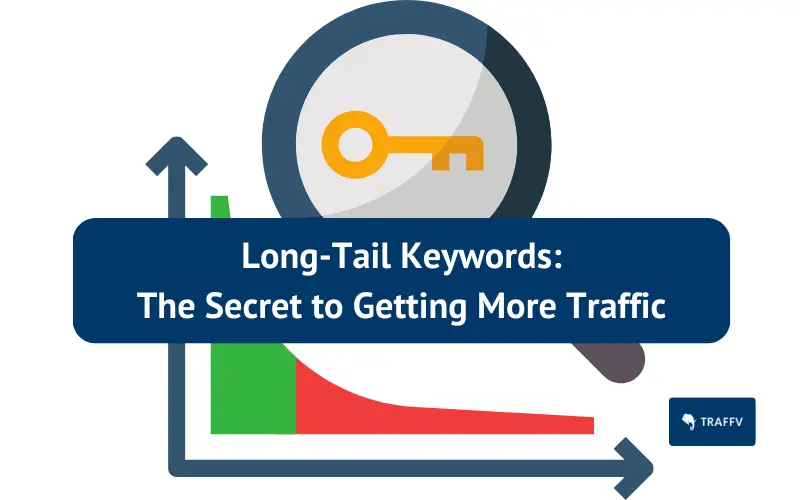Discover the secret to reaching untapped customer bases with long-tail keywords. Learn how to unlock niche markets and boost traffic.

Image courtesy of via DALL-E 3
Table of Contents
Welcome, young readers! Today, we’re going to explore a fascinating topic that can help websites stand out online. We’ll be diving into the world of long-tail keywords and how they can unlock niche markets. But wait, what are long-tail keywords anyway? Let’s find out!
What Are Long-Tail Keywords?
When we talk about keywords, we often hear about two types: long-tail keywords and short-tail keywords. Let’s focus on understanding what long-tail keywords are and how they differ from short-tail keywords.
Definition of Long-Tail Keywords
Long-tail keywords are phrases that are more specific and longer than general keywords. They are like detailed questions or descriptions that people type into search engines when they are looking for something particular. For example, instead of searching for “shoes,” a long-tail keyword could be “best running shoes for beginners with high arches.”
Examples of Long-Tail Keywords
Here are a few more examples to help you grasp the concept of long-tail keywords: “healthy vegan recipes for weight loss,” “DIY home decor ideas on a budget,” or “tips for training a new puppy.” These phrases have fewer people searching for them, but they attract visitors who are specifically interested in those topics.
Why Are Long-Tail Keywords Important?
When it comes to online success, utilizing long-tail keywords can be a game-changer. Let’s explore why these specific keywords play a crucial role in boosting your website’s visibility and attracting the right audience.
Less Competition
One of the key reasons why long-tail keywords are important is that they face less competition compared to broad, short-tail keywords. Think of it this way: if you’re a small boutique selling handmade jewelry, ranking for the term “jewelry” might be challenging due to the high number of competitors. However, targeting a long-tail keyword like “handmade gemstone earrings” can help you stand out in a niche market with less competition.
More Targeted Traffic
Long-tail keywords have the power to attract more specific and interested visitors to your website. When users search for specific phrases like “best organic skincare products for sensitive skin,” they are more likely to be in the buying mindset and looking for exactly what you offer. This focused traffic can result in higher conversion rates and ultimately drive more sales for your business.
Boosting SEO
Using long-tail keywords can also boost your search engine optimization (SEO) efforts. Search engines like Google aim to provide users with the most relevant results for their queries. By incorporating specific long-tail keywords naturally into your content, you signal to search engines that your website is a valuable resource for users searching for those particular terms. This can improve your rankings and make it easier for potential customers to find you online.
Finding Niche Markets
When it comes to online success, understanding how to find niche markets can make a big difference. By using long-tail keywords, you can uncover specific audiences that are often overlooked by broader searches. Let’s dive into how you can leverage these keywords to discover niche markets and cater to niche audiences.

Image courtesy of shortlist.io via Google Images
Identifying a Niche Market
So, what exactly is a niche market? A niche market is a specialized segment of the population that has particular interests or needs. By using long-tail keywords, you can narrow down your focus to target these specific groups. For example, instead of targeting “running shoes,” you could focus on “trail running shoes for women with high arches.” These specific keywords help you hone in on a niche market that is searching for exactly what you offer.
Benefits of Targeting a Niche Market
There are several advantages to focusing on a niche market. By catering to a specific audience, you can create content and products that are tailored to their needs. This targeted approach can lead to higher conversion rates and customer satisfaction. Additionally, niche markets often have less competition, making it easier for your business to stand out. By utilizing long-tail keywords to target these niche markets, you can establish yourself as a trusted source within that specific industry or interest group.
How to Find Long-Tail Keywords?
One way to find effective long-tail keywords is by using keyword research tools. These tools are like treasure maps that help you discover the words and phrases people are searching for online. Some popular tools include Google Keyword Planner, SEMrush, and Moz Keyword Explorer.
Brainstorming Ideas
Another method to come up with long-tail keywords is through brainstorming. Sit down and think about what words or phrases your target audience might use when searching for your content. Put yourself in their shoes and imagine what they would type into a search engine. You can also ask friends or family for their input to get different perspectives.
Using Long-Tail Keywords
When it comes to creating content online, using long-tail keywords can significantly boost your visibility and help you reach a specific audience. Let’s explore how to effectively incorporate long-tail keywords into your content and online presence.

Image courtesy of www.serpple.com via Google Images
Incorporating in Content
Integrating long-tail keywords into your content doesn’t have to be complicated. Simply identify relevant long-tail keywords related to your topic and naturally include them in your articles or blogs. For example, if you’re writing about “best hiking trails in the Pacific Northwest,” using long-tail keywords like “scenic hiking spots in Oregon” or “family-friendly hikes in Washington” can attract readers looking for specific information.
On Your Website
Utilizing long-tail keywords across various sections of your website can enhance your online presence and make it easier for your target audience to find you. Incorporate these keywords in your page titles, meta descriptions, headers, and even in your image alt text. This strategic placement not only helps with search engine optimization but also guides users to relevant content on your site.
Common Mistakes to Avoid
One common mistake people make when using long-tail keywords is keyword overstuffing. This means putting too many keywords into your content in an attempt to rank higher in search engines. However, this can actually have the opposite effect and make your content seem unnatural and spammy to readers. It’s essential to use keywords strategically and in a way that flows naturally within your content.
Using Irrelevant Keywords
Another mistake to avoid is using irrelevant keywords. Choosing keywords that are not related to your content or target audience can harm your site’s credibility and visibility. It’s crucial to select long-tail keywords that are directly related to the topic you are discussing and that align with what your audience is searching for.
Ignoring User Experience
Lastly, one of the most critical mistakes to avoid when using long-tail keywords is ignoring user experience. Your content should always prioritize quality and readability for your audience. If your content is not engaging or informative, even the best-chosen keywords won’t help you retain visitors on your site. Focus on creating valuable content that resonates with your audience and enhances their overall experience.
Tools and Resources
When it comes to finding the perfect long-tail keywords for your content, there are several tools that can make your job much easier. One popular tool is Google’s Keyword Planner, which helps you discover new keywords and provides insights into their search volume and competition level. Another useful tool is SEMrush, which not only helps you find long-tail keywords but also offers competitive analysis and backlink opportunities. Lastly, Ubersuggest is a handy tool that provides keyword suggestions and content ideas based on real-time data.

Image courtesy of traffv.com via Google Images
Additional Learning Resources
For those looking to dive deeper into the world of long-tail keywords, there are plenty of resources available online. Websites like Moz and Backlinko offer in-depth guides and tutorials on keyword research and SEO best practices. YouTube channels such as Neil Patel and Brian Dean’s also provide valuable insights on how to effectively use long-tail keywords to improve your search engine rankings. By exploring these resources, you can enhance your knowledge and take your content to the next level.
Summary
In this article, we have explored the power of long-tail keywords in unlocking niche markets and the benefits they bring to your online presence in terms of SEO advantages.
What Are Long-Tail Keywords?
We learned that long-tail keywords are longer and more specific phrases that capture the essence of what users are searching for, unlike short-tail keywords which are more general.
For example, while a short-tail keyword may be “shoes,” a long-tail keyword could be “women’s running shoes with arch support.”
Why Are Long-Tail Keywords Important?
Long-tail keywords are crucial because they have less competition, attract more targeted traffic, and boost SEO rankings.
By targeting specific long-tail keywords, you can reach users who are actively looking for what you have to offer, increasing the likelihood of conversion.
Finding Niche Markets
Long-tail keywords play a vital role in finding niche markets by helping you identify smaller, specific audiences that have a genuine interest in your products or services.
Focusing on niche markets allows you to tailor your content to meet their unique needs, leading to higher engagement and better relationships with your audience.
How to Find Long-Tail Keywords?
We discussed various methods for discovering effective long-tail keywords, including using keyword research tools and brainstorming ideas to come up with relevant phrases that resonate with your target audience.
By conducting thorough research and analyzing your niche market, you can uncover hidden opportunities for growth and expansion.
Using Long-Tail Keywords
When it comes to using long-tail keywords, it’s essential to incorporate them in your content thoughtfully and strategically to improve your online presence and optimization efforts.
By placing these keywords strategically on your website and in your content, you can enhance your visibility in search engine results and attract more qualified leads.
Common Mistakes to Avoid
We also highlighted some common mistakes to avoid when utilizing long-tail keywords, such as keyword overstuffing, using irrelevant keywords, and neglecting user experience.
Ensuring that your content is relevant, engaging, and user-friendly is key to building trust and credibility with your audience.
By following the guidelines outlined in this article, you can harness the power of long-tail keywords to reach niche markets effectively, boost your SEO efforts, and drive targeted traffic to your website.
Want to turn these SEO insights into real results? Seorocket is an all-in-one AI SEO solution that uses the power of AI to analyze your competition and craft high-ranking content.
Seorocket offers a suite of powerful tools, including a Keyword Researcher to find the most profitable keywords, an AI Writer to generate unique and Google-friendly content, and an Automatic Publisher to schedule and publish your content directly to your website. Plus, you’ll get real-time performance tracking so you can see exactly what’s working and make adjustments as needed.
Stop just reading about SEO – take action with Seorocket and skyrocket your search rankings today. Sign up for a free trial and see the difference Seorocket can make for your website!
Frequently Asked Questions (FAQs)
What Are Long-Tail Keywords?
Long-tail keywords are longer and more specific phrases that visitors are more likely to use when they’re closer to making a purchase or need specific information. They differ from short-tail keywords, which are shorter and more general terms.
How Do Long-Tail Keywords Help My Website?
Using long-tail keywords can greatly benefit your website in several ways. By targeting these specific phrases, you attract more focused and interested visitors to your site. This increases the chances of converting these visitors into customers, leading to a higher conversion rate. Additionally, using long-tail keywords can help improve your website’s search engine rankings, as they have less competition and are more targeted to your audience.
Do Long-Tail Keywords Really Work?
Yes, long-tail keywords are proven to be effective tools for improving your website’s visibility and attracting the right audience. By incorporating these specific phrases into your content and using them strategically across your website, you can enhance your online presence and reach a more targeted audience. Long-tail keywords have been shown to drive higher quality traffic to websites, resulting in better engagement and conversion rates.







